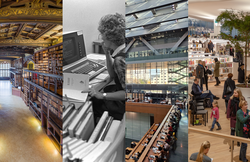Modern era
| Part of the Politics series on |
| Students' rights |
|---|
| Part of a series on |
| Research |
|---|
 |
| Philosophy portal |
| Part of a series on |
| Library and information science |
|---|
 |
Autodidacticism is sometimes a complement of modern formal education. [11] As a complement to formal education, students would be encouraged to do more independent work. [12]
Before the twentieth century, only a small minority of people received an advanced academic education. As stated by Joseph Whitworth in his influential report on industry and innovators dated from 1853, literacy rates were higher in the United States than in England.[ ambiguous ] However, even in the U.S., most children were not completing high school. High school education was necessary to become a teacher. In modern times, a larger percentage of those completing high school also attended college, usually to pursue a professional degree, such as law or medicine, or a divinity degree. [13]
Collegiate teaching was based on the classics (Latin, philosophy, ancient history, theology) until the early nineteenth century. There were few if any institutions of higher learning offering studies in engineering or science before 1800. Institutions such as the Royal Society did much to promote scientific learning, including public lectures. In England, there were also itinerant lecturers offering their service, typically for a fee. [14]
Prior to the nineteenth century, there were many important inventors working as millwrights or mechanics who, typically, had received an elementary education and served an apprenticeship. [13] Mechanics, instrument makers and surveyors had various mathematics training. James Watt was a surveyor and instrument maker and is described as being "largely self-educated". [15] Watt, like some other autodidacts of the time, became a Fellow of the Royal Society and a member of the Lunar Society. In the eighteenth century these societies often gave public lectures and were instrumental in teaching chemistry and other sciences with industrial applications which were neglected by traditional universities. Academies also arose to provide scientific and technical training.
Years of schooling in the United States began to increase sharply in the early twentieth century. This phenomenon was seemingly related to increasing mechanization displacing child labor. The automated glass bottle-making machine is said to have done more for education than child labor laws because boys were no longer needed to assist. [16] However, the number of boys employed in this particular industry was not that large; it was mechanization in several sectors of industry that displaced child labor toward education. For males in the U.S. born 1886–90, years of school averaged 7.86, while for those born in 1926–30, years of school averaged 11.46. [17]
One of the most recent trends in education is that the classroom environment should cater towards students' individual needs, goals, and interests. This model adopts the idea of inquiry-based learning where students are presented with scenarios to identify their own research, questions and knowledge regarding the area. As a form of discovery learning, students in today's classrooms are being provided with more opportunity to "experience and interact" with knowledge, which has its roots in autodidacticism.
Successful self-teaching can require self-discipline and reflective capability. Some research suggests that the ability to regulate one's own learning may need to be modeled to some students so that they become active learners, while others learn dynamically via a process outside conscious control. [18] To interact with the environment, a framework has been identified to determine the components of any learning system: a reward function, incremental action value functions and action selection methods. [19] Rewards work best in motivating learning when they are specifically chosen on an individual student basis. New knowledge must be incorporated into previously existing information as its value is to be assessed. Ultimately, these scaffolding techniques, as described by Vygotsky (1978) and problem solving methods are a result of dynamic decision making.
In his book Deschooling Society , philosopher Ivan Illich strongly criticized 20th-century educational culture and the institutionalization of knowledge and learning - arguing that institutional schooling as such is an irretrievably flawed model of education - advocating instead ad-hoc co-operative networks through which autodidacts could find others interested in teaching themselves a given skill or about a given topic, supporting one another by pooling resources, materials, and knowledge. [20]
Secular and modern societies have given foundations for new systems of education and new kinds of autodidacts. As Internet access has become more widespread the World Wide Web (explored using search engines such as Google) in general, and websites such as Wikipedia (including parts of it that were included in a book or referenced in a reading list), YouTube, Udemy, Udacity and Khan Academy in particular, have developed as learning centers for many people to actively and freely learn together. Organizations like The Alliance for Self-Directed Education (ASDE) have been formed to publicize and provide guidance for self-directed education. [21] Entrepreneurs like Henry Ford, Steve Jobs, and Bill Gates are considered influential self-teachers. [22]

